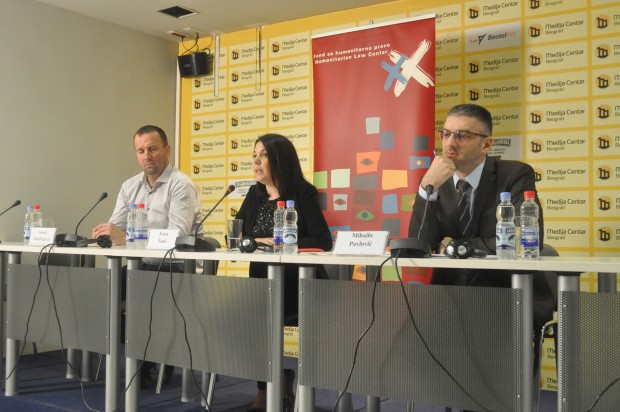Justice deprived of majority of victims
On June 28th 2018, the Humanitarian Law Center (HLC) presented its Report, “Circumventing Justice: The Statute of Limitation as a Mechanism for Denying War Victims the Right to Compensation”. The Report analyses the practice of courts of the Republic of Serbia in proceedings for the compensation of damages which have occurred as a consequence of the conflicts during the 1990s, and the way in which the courts have interpreted the legal provisions that apply to the statute of limitation for damages arising from a criminal offence.
According to the Coordinator of the HLC legal team, Ivana Žanić, since its establishment in 1992, the HLC has represented in courts more than 1,000 victims of human rights violations during the armed conflicts in Croatia, Bosnia and Herzegovina and Kosovo. Among them are Croatian citizens who were detained in the Stajićevo and Begejci camps in Serbia, Bosniaks who, after the fall of the Žepa enclave, fled to Serbia and were then detained in the camps of Šljivovica and Mitrovo Polje, forcibly mobilized refugees during 1995, Albanians who were held in unlawful detention in prisons across Serbia, and many other victims of human rights violations committed in the context of these armed conflicts and the repressive regime in Serbia at the time, with Slobodan Milosevic at the helm. In all these procedures, the victims faced the same problems: the courts placed no trust in their testimonies, in most cases the courts did not consider the evidence presented, and also interpreted differently the provisions of the law relating to the statute of limitations for claims for damages. After numerous years of exhausting procedures, the vast majority of the victims have remained deprived of justice. Such practice by the courts in Serbia is just another way of stating to the victims that Serbia does not care about the suffering and pain caused by the state organs of Serbia, and is further indication that there is still no clear expression of the will of the institutions in Serbia to face the severe consequences of human rights violations rights in the past.
The author of the Report, Mihailo Pavlović, lawyer at the HLC, points out that the courts have been faced with several problems difficult of resolution: first of all, regarding the application of extended periods of the statute of limitation in circumstances where the direct perpetrator of the crime is responsible for the damage, as well as the Republic of Serbia – which is, of course, responsible for the actions of its bodies; second, regarding the application of interruptions and delays in the statute of limitation that were implemented in the legal system in order to place the victims in a more favourable position; and finally, regarding the jurisdiction of the civil courts in deciding on the existence of a criminal offence in the compensation procedure, as a preliminary matter. Regarding all these delicate questions for domestic judges, the provisions on the statute of limitation have always been interpreted to the detriment of victims. The reasons are many, and range from the Republic of Serbia’s unwillingness to recognise the violation of the human rights of victims of the conflicts during the 1990s for which its bodies are responsible, to the protection of the state’s budgetary funds. Pavlović points out that judicial practice in all these matters has been inconsistent: that the courts, with their interpretation of the statutory norms of the statute of limitation, have disregarded the intention of the lawmakers to put the injured party who suffered the damage as a result of the criminal offense in a more favourable position; and that the courts have voluntarily changed those views that initially supported the victims, without a basis in amendments to the law or any other justified reason. All of this has led to the violation of the principle of “equality of arms” at the expense of the victims, on whom has been imposed a disproportionate burden of the court proceedings, which has further led to legal uncertainty, and to the undermining of the basic principles of the rule of law – in other words, to a collapse of the rule of law.
Senad Jusufbegović is one of several dozen detainees in the camps of Šljivovica and Mitrovo Polje who sued the Republic of Serbia in 2007. Like the other plaintiffs, he was convinced that the trial they had initiated could only end to the benefit of the victims. Instead, the victims faced the practice by the judge of entering the victim’s testimonies into the record but contrary to what they actually stated, such as indicating that they were accommodated in “reception centers” rather than in camps, and with the interpretations of a medical expert who claimed to have found that there had been no reduction in the plaintiff’s overall life-ability, since in the years following his release from the camp he had continued his education, graduated from college, got hired and founded a family. One of the problems was that the courts believed more the testimony of a member of the MUP of Serbia than the statements of a large number of victims who suffered torture directly in the camps. Senad’s compensation lawsuit is still underway after eleven years, and is currently before the European Court of Human Rights in Strasbourg, by legal application of the HLC.
The HLC currently represents victims in 29 proceedings before the courts in Serbia. In addition, the HLC represents victims in eight proceedings before the European Court of Human Rights, in which the Court is expected to respond to the views of the courts in Serbia, inter alia regarding the statute of limitation of claims for damages resulting from a criminal offence.







